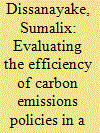|
|
|
Sort Order |
|
|
|
Items / Page
|
|
|
|
|
|
|
| Srl | Item |
| 1 |
ID:
111317


|
|
|
|
|
| Publication |
2012.
|
| Summary/Abstract |
This paper1 takes as its starting point the observation that fuel prices - and thus taxes - are important for good management of climate change and other environmental problems. To economists this should be no surprise yet it seems that the role of fuel taxation as an instrument of climate policy has not been fully appreciated. It is however one of the few policy instruments that, since several decades, has actually reduced fuel consumption appreciably. Thanks to taxation (mainly in Europe and Japan), carbon emissions are considerably lower than they would have been otherwise. In future where carbon emissions are to be cut drastically, this instrument will be crucial. There is however much opposition to the instrument. This opposition uses various arguments, for instance that fuel taxes hurt the poor since they are strongly regressive. We however find that the choice of country and methodology turns out to be of great consequence. We study seven European countries-France, Germany, United Kingdom, Italy, Serbia, Spain and Sweden and do find some evidence of regressivity but the evidence is very weak. It does not apply when lifetime income is used and it does not apply to the poorest country in the group. The best one-line summary is probably that the tax is approximately proportional.
|
|
|
|
|
|
|
|
|
|
|
|
|
|
|
|
| 2 |
ID:
169861


|
|
|
|
|
| Summary/Abstract |
Using the energy-environmental version of the Global Trade Analysis Project, this study compares the effects of three carbon emissions mitigation strategies – a carbon tax, a fuel tax and an emissions trading scheme (ETS) to combat the intended emissions target for Indonesia, a large emitting developing country. Although the fuel tax was found to raise economic growth by 0.29% in 2030, the carbon tax and ETS which reduce economic growth by about 0.11% have less adverse effects on inflation, welfare loss, wage decline, and employment loss. Unlike the fuel tax, the carbon tax and ETS are also likely to promote substitution towards renewable energy given the massive increase in the price of coal of over 100% due to the carbon tax and ETS. To meet Indonesia's emissions target, a carbon tax of US$36/ton of CO2 is needed. The carbon tax which is simpler and more swiftly implementable is the more practical choice compared to the ETS in the short to medium term for developing countries with political economy constraints in their energy and transportation sectors.
|
|
|
|
|
|
|
|
|
|
|
|
|
|
|
|
| 3 |
ID:
176840


|
|
|
|
|
| Summary/Abstract |
The purpose of this research is to investigate policy synergies and market interdependencies in the field of alternative powertrain technologies. The methodology is based on a simulation model grounded on system dynamics, a method that focuses on the structure (particularly feedback processes) and behavior over time of complex systems. The impacts of four policy measures on the uptake of electric cars in six countries (China, France, Germany, India, Japan and the United States), each segmented in five consumer groups, are explored. We observe that the additive impact of individual policies is lower than the impact of a corresponding policy package and that the impact of a policy package is greater if pursued by countries jointly. The implications of these findings are that the uptake of electric powertrains may depend not only on the combined impact of country-specific policy measures but also on the joint effect of policies in key electric car markets. The originality of this research arises from the endogenization of the electric car battery price evolution by explicitly modeling policy packages in six major car markets and interlinking them.
|
|
|
|
|
|
|
|
|
|
|
|
|
|
|
|
| 4 |
ID:
164721


|
|
|
|
|
| Summary/Abstract |
Under pressures related to economic growth and environmental protection, China is facing an increasingly severe “environment–health–poverty” trap risk. Fuel taxation is generally considered an effective policy to counter such a risk. Since 2009 China has raised the fuel tax rate many times to enhance tax reform. However, the effects of this policy remain unknown. Therefore, it is vitally important to estimate the impacts of China's current fuel taxation policy on environment, public health and the national economy. As the first attempt in existing literature on China, this paper builds a general equilibrium framework with the feedback effect of public health on economy. We find that that the fuel tax policy benefits the adjustment of the economic structure and improves human health; however, it is detrimental to economic growth, public welfare and price stability. In this sense, it plays a limited role in reducing the trap risk and might not be sustainable in the long term.
|
|
|
|
|
|
|
|
|
|
|
|
|
|
|
|
|
|
|
|
|